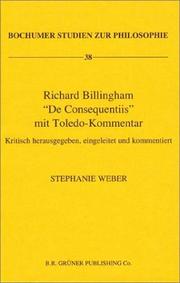| Listing 1 - 2 of 2 |
Sort by
|

ISBN: 1283128047 9786613128041 9027284199 9789027284198 906032367X 9789060323670 Year: 2003 Publisher: Amsterdam ; Philadelphia : B.R. Gruner,
Abstract | Keywords | Export | Availability | Bookmark
 Loading...
Loading...Choose an application
- Reference Manager
- EndNote
- RefWorks (Direct export to RefWorks)
The theory of consequences is one of the most important developments of medieval logic and was an integral part of the logic curricula at universities. One of the most famous authors of school tracts in the 14th century was Richard Billingham who was well known for his Speculum puerorum, a famous and influential text in the 14th and 15th century. This book includes the critical editions of three copies of Billingham's tract De consequentiis and the edition of the Toledo commentary on this tract. Apart from these texts the book will consider some short school tracts of Billingham's contemporaries as well as the elaborated treatises on the consequences in Ockham's Summa logicae and Burleigh's De putitate artis logicae. The introduction gives information about the author, the historical context and the latest developments of research. The concept of consequences in the British tradition is discussed in the detailed commentary on Billingham's tract which follows the editions.Die Folgerungslehre ist eine der bedeutendsten Entwicklungen mittelalterlicher Logik und war integraler Bestandteil der Logik-Curricula an den Universitäten. Zu den bedeutendsten Autoren von Schultraktaten im 14. Jh. zählt Richard Billingham, Autor des Speculum puerorum, einem berühmten und einflußreichen Text über das Beweisen von Aussagen. Die vorliegende Arbeit enthält die kritischen Editionen dreier Kopien von Billinghams Traktat Über die Folgerungen (De consequentiis) und die Edition des Toledo-Kommentars zu diesem Traktat. Darüber hinaus werden in der Arbeit einige zeitgenössische Schultraktate sowie die ausgearbeiteten Abhandlungen zu den Folgerungen in Ockhams Summa logicae und Burleighs Traktat De puritate artis logicae berücksichtigt. Die Einleitung informiert über den historischen Kontext, den gegenwärtigen Forschungsstand sowie über den Autor und sein Werk. Den Editionen schließt sich ein ausführlicher Kommentar an, in dem der Folgerungsbegriff der Britischen Tradition diskutiert wird und der dem Leser weitere Hilfen zum Verständnis des Textes bietet.
Consequentia (Logic) --- Logic, Medieval --- Billingham, Richard, --- Billingham, Richard

ISBN: 1283128055 9786613128058 9027284202 9789027284204 9060323661 9789060323663 Year: 2003 Publisher: Amsterdam ; Philadelphia : B.R. Gruner,
Abstract | Keywords | Export | Availability | Bookmark
 Loading...
Loading...Choose an application
- Reference Manager
- EndNote
- RefWorks (Direct export to RefWorks)
As the title indicates the author presents a contemporary theory of consequence. In so doing he establishes a terminology that enables a description, interpretation and evaluation of medieval theory independently of medieval vocabulary.In the interest of better understanding the medieval writers the author puts himself in the position of the medieval scholar in Erfurt. The reader learns about the Erfurt schools and the controversal debate on the so-called modi significandi, using only texts that are known to have been available in Erfurt in the first half of the 14th century.The two tracts, a short epitome of Thomas Maulfelt and a comprehensive volume of Albert of Saxony represent the two most common tracts of this discipline, and are discussed on the basis of questions arising in the introduction. New conclusions can be reached about the scope and the goal of medieval consequence theory which is an original accomplishment of the high Middle Ages and its place in the history of logic.Der Ankündigung im Titel gehorchend stellt der Autor eine zeitgenössische Theorie zu Schlußfolgerung dar. Somit wird eine Terminologie erstellt, in der - unabhängig von der Fachsprache des Mittelalters - die verschiedenen Ausführungen zur Schlußfolgerungslehre des Spätmittelalters beschreiben, interpretiert und bewertet werden können.Um die mittelalterlichen Autoren Thomas Maulfelt und Albert von Sachsen zu verstehen, versetzt sich der Autor in die Perspektive eines Scholars im Erfurt der Mitte des 14. Jahrhunderts. Der Leser wird über die Schulsituation in Erfurt unterrichtet, er erfährt von der hitzigen Debatte um die modi significandi und blickt zur weiteren Erläuterung lediglich in solche Schriften, deren Vorkommen für die Mitte des 14. Jahrhunderts in Erfurt belegbar sind.Anhand von Fragestellungen, die sich aus dem Einleitungsteil ableiten, werden die zwei Traktate, die in Form, Inhalt und Umfang die zwei häufigsten Schrifttypen zur Schlußfolgerungslehre repräsentieren, untersucht. So ergeben sich zur Anwendungreichweite, zur Zielsetzung dieser Disziplin, die eine originäre Leistung des hohen Mittelalters ist, sowie zu ihrem Stellenwert in der Logikgeschichte neue Erkenntnisse.
Consequentia (Logic) --- Logic --- Argumentation --- Deduction (Logic) --- Deductive logic --- Dialectic (Logic) --- Logic, Deductive --- Intellect --- Philosophy --- Psychology --- Science --- Reasoning --- Thought and thinking --- Logic, Medieval --- History --- Methodology --- Maulfelt, Thomas, --- Albertus, --- Albert, --- Alʹbert, --- Alberto, --- Albertus de Saxonia, --- Альберт, --- Maulfelt, Thomas --- Albert de Saxonia --- Germany --- To 1500
| Listing 1 - 2 of 2 |
Sort by
|

 Search
Search Feedback
Feedback About UniCat
About UniCat  Help
Help News
News